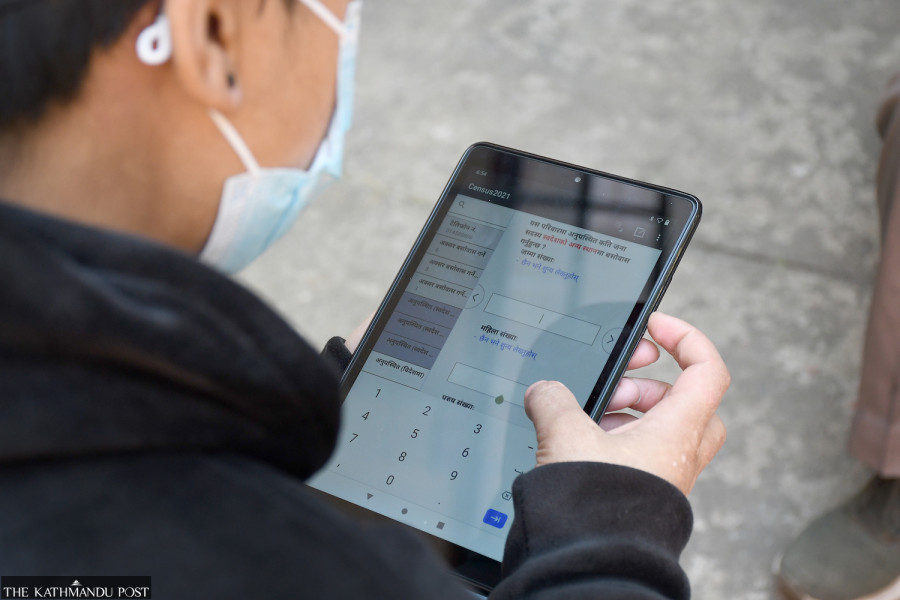
The national census started on November 11 and will be over on November 25. Post File Photo
Enumerators deployed by the Central Bureau of Statistics are currently busy collecting data from households across the country as part of the ongoing census. But there’s one particular region in the country where the enumerators have yet to reach.
Tinkar and Chhangru are two villages bordering India in Darchula, on the northwestern corner of the country. The region is remote and inaccessible, as there is no road link within the Nepali territory. People have to travel via India to reach the villages. And they need entry passes issued from India’s local authorities.
“Last Thursday, we had sent a request to the Sub-divisional Magistrate Office in Dharchula of Pithoragarh, India asking to provide entry passes to Nepali census staff so that they could travel to Tinkar and Chhangru via India,” said Jyotsna Bhatta Joshi, assistant chief district officer of Darchula. “But the Indian side is yet to issue entry permits.”
She said that the Indian side “has notified” that the permits could not be issued because the sub-divisional magistrate was unavailable.
“I had a talk with one of the officials at the Sub-divisional Magistrate Office on Tuesday evening as well,” she told the Post over the phone from Darchula. “I have been told that permits could be issued in a day or two once the magistrate, who is busy with administrative arrangements for a fair in Jauljibi, attends the office.”
Jauljibi, on the Nepal-India border, is a small town in Dharchula of Pithoragarh in India and is known for the historical trade fair it has been organising for decades.
The fair, said to be observed since 1911, was not organised last year due to the Covid-19 pandemic and this year it is being observed from November 14-24.
With no clarity on when the Sub-divisional Magistrate is returning to office, it is uncertain if Nepali enumerators can get their entry passes.
The census started on November 11 and will be over on November 25.
The Darchula District Census Office is also awaiting the entry passes to send its staff for conducting the census in Tinkar and Chhangru.
“We had requested our District Administration Office to take initiatives for arranging entry passes for our staff on November 11 and the local administration also did accordingly,” Padam Raj Pandey, district census officer in Darchula, told the Post over the phone. “We are also waiting for the entry passes from the Indian authorities.”
Senior officials at the Central Bureau of Statistics (CBS), however, do not seem to be much concerned about the delay in issuing the entry passes to Nepali census staff to reach the two villages.
Hem Raj Regmi, deputy director general at the bureau, said he is confident that Indian authorities would issue entry passes as Tinkar and Chhangru are not areas that India claims to be its own like it does in the case of Kalapani, Lipulekh and Limpiyadhura.
“Not giving entry passes to our enumerators won’t look good for India itself from the perspective of bilateral relations that Nepal and India enjoy,” Regmi told the Post. “I expect our census staff will get entry passes in a few days and they will be able to conduct the census in Tinkar and Chhangru.”
Given the officials’ struggle to conduct the census in these Nepali villages in Vyans Rural Municipality, the prospects of conducting the census in Kalapani, Lipulekh and Limpiyadhura are low.
The Kalapani region claimed by India as its own was reclaimed by Nepal last year after then KP Sharma Oli government published a new map showing them as Nepali territories. The move in May last year had led to diplomatic tensions between Nepal and India.
As the Kalapani region remains completely under India’s administrative and military control, conducting the census there without India’s permission is impossible, according to CBS officials.
The bureau had requested the Foreign Ministry last month to take a diplomatic initiative with India so as to enable it to conduct the census in the region.
“The Foreign Ministry has not yet responded to us in that regard,” said Regmi.
CBS said last week that it would go for an “indirect census” in the Kalapani region if its staff cannot reach there in person. The bureau has been considering two options.
One option is counting the number of households using satellite imagery and estimating the number of people based on that. Another option under consideration is estimating the current population based on India’s census report of 2011, according to which, there are 363 people in Kuti, 78 in Nabi and 335 in Gunji—the three villages in the region.
The CBS had floated these options earlier this year as well.
Failure to conduct the census in Nepal’s own Tinkar and Chhangru villages could mean a major setback for the CBS, which has made “my census, my participation” its motto.
Ashok Bohora, chairperson of Ward 1 of Vyans Rural Municipality, said that there is a foot trail to reach Tinkar and Chhangru, but it was damaged badly by landslides during this monsoon.
According to him, a contractor has been working to rehabilitate the damaged foot trail to Tinkar and Chhangru, but the progress has been sluggish given the difficult topography.
Even the Nepal Army had started the construction of the Darchula-Tinkar road in May last year, but there has been little progress, according to Bohora.
The Darchula-Tinkar Road Project had opened a track from Khalanga, the district headquarters of Darchula, to Tinkar Bhanjyang on the Nepal-Tibet border 12 years ago. The road project is considered one of the most significant projects for the development of the Sudurpaschim region.
With no proper road to Tinkar and Chhangru, Nepalis to and from there are left with no option than to travel through the Indian territory.
“Anyway, local people and Nepali officials prefer to reach the villages via India because roads are better on the Indian side,” Bohora told the Post over the phone.
But there are hassles. Indian authorities have put up a lengthy bureaucratic process for traveling via their territory.
For Nepalis living in the two villages, travelling to India itself is not easy and entry passes are a must.
During the listing process of the census, officials had found 113 households in Tinkar and Chhangru.
“The listing process showed there are 113 households in Tinkar and Chhangru,” said Pandey. During the listing, supervisors count houses, households and members of each family before the actual census which is currently underway.
According to officials, the Indian authority had provided entry passes for the supervisors to go to the two isolated villages via India to conduct the listing process which was conducted from September 15 to October 4.
Pandey, the district census officer, said that his office has already apprised the Central Bureau of Statistics in Kathmandu of the situation in the field and the attempts being made to ensure census staff’s entry to Tinkar and Chhangru via India.
A former top official at CBS said that failure to conduct the census in Nepal’s own villages would reflect badly on the Nepali administration.
“There cannot be—and should not be—any excuse for not conducting the census in Tinkar and Chhangru,” said Rudra Suwal, former deputy director general at the bureau. “The census must be conducted in these villages regardless of whether India provides entry passes or not.”













